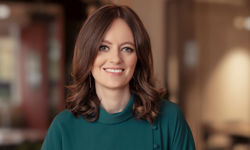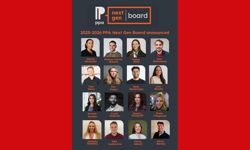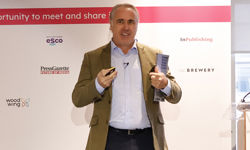After 38 years in the business, Kevin Hand has seen it all - in publishing terms, at least. From early misplaced predictions of the imminent demise of women's weeklies to the latest fears about the death of print, he's remained upbeat in the face of the doomsayers, even during the current storm that's been created by the rise of digital and economic uncertainty. And he has done this, he says, by never under-estimating human nature.
"People are too fond of predicting things are going to end", Hand believes. "Usually, something will come along that's better than what's been before and yes, we've got to keep our minds on that. But why, for example, in this day and age when digital media can now reach anybody in the business to business world, are live events more popular than ever? Because human beings want to come together." And by the same measure, even in today's digital world, he insists, people still like to see and feel a physical product.
We are speaking in early February, just two days into his new role as PPA chairman. And the former CEO of Emap and ex-chair of Hachette UK, chair of business media data and information service Dods and Honorary VP of the European Magazine Media Association is clearly relishing the opportunity his new role will provide him to champion all corners of the publishing business - consumer and B2B, digital and print.
Though eager to stress his new role is all about helping and supporting PPA CEO Barry McIlheney and his team, Hand is quick to clarify his hopes for greater unity within the publishing business.
Publishers working together
"I'd like the PPA to encourage the industry to look at how much publishers have in common rather than the tiny differences we have so we can pull together more than we have done in the past. We have to because this is an industry that on the one hand is enormously challenged and on the other has enormous opportunities", he says. "The more we can learn from one another, the less it is about relative advantage. As we focus more on the advantage of the industry as a whole, the more sensible that will be."
This argument for closer co-operation and greater harmony might seem a bit rich coming from a senior industry executive whose reputation has been built on the corporate cut and thrust of building, buying and selling publishing businesses.
Once described as having "bought more magazines than any other single human being on this earth", Hand is the man who in the 1990s built Emap France from scratch into France's largest publisher, after all. And, after parting company with Emap following its disastrous US acquisition in 2001, it was he who persuaded Hachette to buy teen publisher Attic Futura. More recently, he's been working as special advisor to Hearst Magazines UK following its formation last autumn by Hearst's acquisition of Hachette.
Yet it is this breadth and depth of industry experience that surely now makes him ideally suited to his latest role.
"Take specialist publishing - they've been involved in digital for years now and it's a natural part of what they do", he continues, warming to his theme. "If you are a runner or a mountain biker or a fisherman, you're used to being connected not only with your magazine - which excites and stimulates you in a way no other medium can: it's colourful, tactile and has all those lovely connections enthusiasts want - you also want to be able to go online to book a place in your next race or access a personalised training schedule. Then look at B2B and you'll see a lot of the same approaches."
Nurturing commercial talent
A number of lessons are already apparent from the tectonic shifts that have re-written the rules of publishing over the past decade - lessons others must now learn from, Hand suggests. Such as? Well, for a start, the importance of cross-platform commercial talent.
"For years, the PPA has spoken about training for our journalists - which is right and proper. But I now think we need to look at more training for our commercial people because their job is immensely more challenging and complicated than it has been in the past", he says. "They must be at ease selling digital and print, now. For any 22 year-old coming into the business today, if they're not offered the chance to sell off multi-platforms then they're going to feel left behind. Moving forward, it will be less about numbers, more about the quality of the audience we sell, whatever the platform we reach them on. And to do this successfully, these people need to be trained."
Further work is also required when it comes to publishers' understanding of how best to use the different digital platforms now available, Hand suggests.
The model for magazine publishers online is still evolving, he points out: "We probably don't need to 'put' a magazine online. We've got to think about this differently - to use magazine content on a website to create its own experience." The model for tablet publishing is also still evolving. "The figures are very exciting of course but still very small", he adds. "I think the answer will be simpler than the all singing and dancing reproduction of a magazine that springs to life and spins around, people thought of at first - I'm just not sure the money's there to support that."
Concentrating resources
Another lesson for the industry relates to the shape and size businesses will need to take greatest advantage of the shifting sands of digital publishing moving forward.
"I suspect what will happen is that a number of bigger companies, both B2B and consumer, will in recognition of the tasks, opportunities and dangers ahead of them, want to concentrate on a little less - to focus less on absolute volume, more on relative importance in the marketplace", he adds. "More and more publishers will look at where they can win and win big and where they can't, they will divest. We will see a plethora of small publishers able to make a living on the brands bigger publishers no longer make their priority."
Moving forward, there are going to be a lot of private equity-funded buy outs of parts of bigger businesses, he predicts, pointing to business publisher UBM's recent £10m sale of its agriculture and medical portfolio - including titles such as Farmers Guardian and Pulse - to the founders of the Media Briefing. Company structures, meanwhile, will need to re-focus around content brands with IT systems once more brought back in-house, reversing the outsourcing trend of recent years.
"Getting hold of the most valuable clients and trying to serve them in as many different ways as they can - providing the best service - will depend on brilliant IT systems", he explains. "But it is also inevitable that everything will become centred around brand."
The appropriate management style for this brave new world will be: always delegate everything, except recruitment.
"Pushing as much responsibility down the line as you possibly can makes your life easier. It makes people take ownership of their business, and because they are closer to a problem, they should have a better view than you", he says. "Absolutely crucial is to let the best argument win - just because something was the best way yesterday doesn't mean it will be the best way tomorrow. The other thing senior management must do is lead by example - the way they behave is absolutely critical to the people within their organisation: it's not what you say, but what you do."
Recruitment, however, is a critical issue and one that the industry's leaders must retain close control over to keep the culture of their company, he believes. And by this he is referring to recruitment at all levels within the organisation - especially wooing, training and retaining the next generation of new publishing talent.
"I can't tell you the amount of money we spend on recruitment, correcting problems we wouldn't have had if we'd got young people in in the first place," Hand says. "Because you pay at the other end, why not be proactive and let them grow? You've got to accept you won't see a return on that investment of time and effort within twelve months, but the job of a leader is to take the longer view. Because the amount of high level recruitments that fail is quite terrifying."
Winners in tomorrow's publishing business will be those who put the greatest emphasis on the quality of the products they produce, he predicts. Those who obsess about service. And those who invest in systems that allow them to be flexible enough to serve their customers on any platform and change their business models as new models emerge. Above all, however, tomorrow's winners will be open-minded enough to look at a competitor and work to turn them into a colleague and partner.
"We've got to keep working to improve quality because the challenges we now face are coming from all directions - including people who are not even publishers", Hand explains.
"Take the fashion business where ASOS and Net-A-Porter, though not conventional publishers, are competing with traditional publishers anyway. Where we can, we must learn to get on and work together, forming alliances with people who are supposedly the enemy. It's about finding a balance, looking at how together we can become stronger - which must be a fundamental priority and is already an important focus for the PPA. For me, it's critical."










